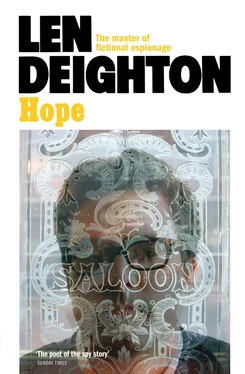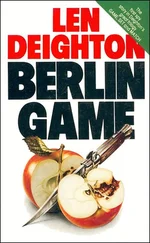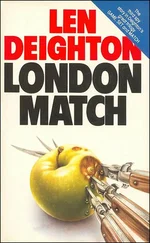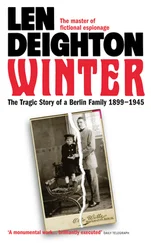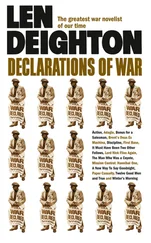A tall man in a green trenchcoat stopped me, waved a cigarette, and asked for a light. I tucked my umbrella under my arm, held up my lighter, and he cupped his hands and bent his head to it. ‘I thought you were on the flight to Paris,’ I said.
‘They’ve killed George Kosinski,’ he said hoarsely. ‘They lured him out to his brother’s house, slit his throat like a slaughtered hog and buried him in the forest. You’ll be next. I’d scram if I was you.’
‘You are not me, Boris,’ I said. Tiny sparks hit my hand as he inhaled on his cigarette. He threw his head back, his eyes searching my face, and blew smoke at me. Then with an appreciative smile he tipped his grey felt hat in mocking salute and went on his way.
‘Come along!’ said Dicky when I had caught up with him again. ‘They just want to talk to foreigners. We can’t be delayed by every bum who wants a light.’
‘Sorry, Dicky,’ I said.
By this time Dicky had eased his way into a small group of men who were passing booklets from hand to hand. Two of the men were dressed in Russian army greatcoats and boots; the civilian caps they wore did not disguise them. One was about forty, with a face like polished red ebony. The other man was younger, with a lop-sided face, half-dosed eyes and the frazzled expression that afflicts prematurely aged pugilists.
‘Look at this,’ said Dicky, showing me the book that had been passed to him. It had a brown cover, its text was in Russian with illustrations depicting various parts of an internal combustion engine. Another similar book was passed to him. He looked at me quizzically. ‘You can read this stuff. What’s it all about?’
I translated the title for him: ‘BG-15 40mm grenade-launcher – Tishina. It’s an instruction manual. They all are.’ The booklets were each devoted to military equipment of wide appeal: portable field kitchens, rocket projectors, sniperscopes, nightsights, radio transmitters and chemical protection suits. ‘They’re Russian soldiers. They’re selling in advance equipment they are prepared to steal.’
Dicky passed the booklets to the man standing next to him. The man took them and, seeing Dicky’s dismay, he looked around the group and snickered, exposing many gold teeth. He liked gold: he was wearing an assortment of rings and two gold watches on each wrist, their straps loosened enough for them to clatter and dangle like bracelets.
The hands of the two soldiers were callused and scarred, and covered from wrist to fingertip in a meticulous pattern of tattoos like blue lace gloves. I recognized the dragon designs that distinguished criminal soldiers who’d served time in a ‘disbat’ punishment battalion. Until very recently, to suffer such a sentence had been universally regarded as shameful, and kept secret from family and even comrades. But now men like these preferred to identify themselves as military misfits, defiant of authority. Such men liked to use their tattoos to parade their violent nature, to exploit frightened young conscripts and sometimes their officers too.
‘Let’s move on,’ I said.
‘What were they saying?’
‘Gold-teeth seems to be the black-market king. You heard the soldiers say tak tochno – exactly so – to him instead of “yes”. It’s the way Soviet soldiers have to answer their officers.’
My whispered aside to Dicky attracted the attention of the soldiers. The limited linguistic skills of all concerned were clearly hampering the transaction, and I didn’t want to wind up as the interpreter for these Russian hoodlums and their Polish customers. ‘Move on,’ I said.
Dicky got the idea. He moved away and the black-marketeers closed in upon the soldiers again. At the next stall Dicky hunkered down to feign interest in piles of old brass and copper oddments piled up for sale. I took the opportunity to look around. There was no sign of George anywhere.
‘Look – umbrellas!’ said Dicky, standing up and rubbing his knees, and then pointing to an old woman carrying dozens of them, of all shapes and sizes and colours. ‘What did you pay for yours?’ When I didn’t reply, he said: ‘Can you imagine those bloody soldiers selling their weapons! That’s what comes of having all those races and nations mixed together. Thank God the British army could never sink to that.’
‘The elder of them had four small kids, and his unit hasn’t been paid for three months,’ I said.
‘I knew you’d find some excuse for them,’ said Dicky in a voice that mixed jokiness with sincerity. ‘Where do you draw the line, Bernard? If you hadn’t been paid for three months, would you simply sell off anything you could lay your hands on?’
Knowing that a flippant answer would be stored up in Dicky’s memory and used when I least expected it, I found something to occupy his mind: ‘I think I see one of George’s relatives,’ I said.
‘Where? Where?’
‘Take it easy, Dicky. Or we’ll start a stampede.’
‘Selling the beads?’
‘It’s amber,’ I said, ‘and that can be expensive. But the leather bag round his neck almost certainly contains diamonds. He’s a well-known dealer.’
‘You know him?’ Dicky slowed, as if intending to stride across the aisle to confront the old man, but I took his arm and kept him going.
‘I saw him in London at one of George’s cocktail parties. But I didn’t speak with him; he arrived as I was leaving. He’s rich; leave him for another time. Appearances are deceptive in Poland; there are probably quite a few rich people in this market today.’
‘And are George Kosinski’s family all rich?’ Dicky stopped at a stall piled high with sports shoes: Nike, Reebok and all the famous brands in cardboard boxes. It was hard to know whether they were counterfeit or imports. Dicky picked up a pair of running shoes and fiddled with the laces while trying to decide.
‘I don’t know, but names ending in ski denote the old Polish gentry. It’s especially so in the country areas, where everyone knows everyone and you can’t get away with adding a ski ending to your name, the way so many of the townspeople have.’
‘I like the padded ankle collar… What have you seen?’ He started to replace the shoes he was inspecting.
‘Keep hold of that pair of shoes, Dicky. Bring them up before your face and admire them.’ I was moving round to the other side of the market stall to see better.
‘Look, Bernard…’
‘Do as I say, Dicky. Just keep talking and holding up the shoes.’ He held them up for me and provided an excuse for a good look at the far side of the market.
‘What’s happening?’
‘Three of them; at least three. With maybe two or three more watching from other top-storey windows. They’ve marked us, and two of them are coming this way.’
‘Who?’
‘Hoodlums. Just take it easy. Stay stumm; let me talk to them.’
‘Where?’
‘The fat fellow in the fur coat signalled to someone at an upstairs window. Bodyguards. Minders. Stay cool.’
‘Your papers?’ demanded the first of the men to arrive, and announced himself: ‘Inspector Was of the UB.’ He spoke in English while showing me a card with his photo on it. He snapped the card closed and put it away. His eyes were jet-black, his face thin and drawn. He wore a woollen hat and a short leather jacket. I held out to him the West German passport that carried the business visa permitting repeated entries into Poland. He passed it to a fat man in a dark fur coat who had by this time arrived slightly flushed and out of breath. The fat one pushed his steel-rimmed glasses tighter on to his ears before reading it. He was red-faced and sweating. I guessed he had impetuously descended too many flights of steps after watching our arrival from his vantage-point in the nearby tenements.
Читать дальше
